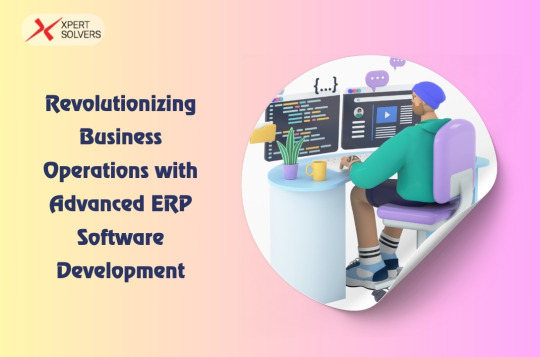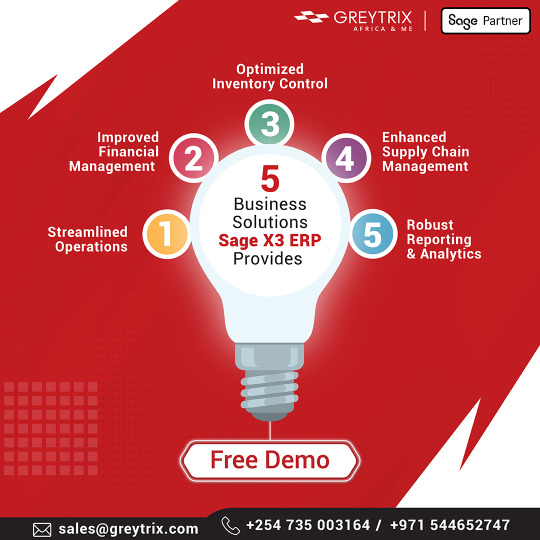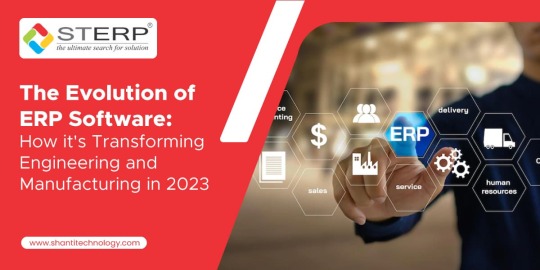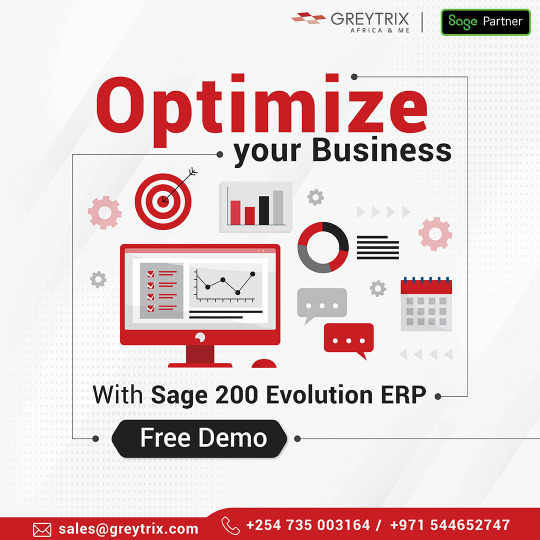#ERP Evolution
Text
Revolutionizing Business Operations with Advanced ERP Software Development
The world of business is on the cusp of a transformation.
XpertSolvers invites you to explore the exciting frontier of ERP software development, where cutting-edge technologies are revolutionizing the way businesses operate.
Get ready to delve into the future, where AI-powered insights, robust cloud solutions, and secure blockchain integration redefine what's possible for your organization.

The Future of ERP: A Symphony of Innovation
AI-Driven Insights – Unlocking the Power of Your Data: Imagine an ERP system that acts as your strategic partner, analyzing vast amounts of data to provide actionable insights.
With AI in ERP, your system becomes a predictive powerhouse, enabling you to anticipate market trends, automate routine tasks, and make data-driven decisions with unparalleled confidence.
Cloud Solutions – Scalability and Accessibility Redefined: Legacy ERP systems are a thing of the past. Cloud-based solutions offer unparalleled flexibility and scalability, allowing your ERP system to grow alongside your business.
Access your data securely from anywhere, anytime, and empower your workforce to collaborate seamlessly – the future of ERP is borderless.
Blockchain Technology – Building Trust, One Block at a Time: The secure and transparent nature of blockchain technology is transforming ERP development.
From secure supply chain management to enhanced financial transaction security, blockchain fosters trust and transparency across your entire business ecosystem.
Business Optimization with User-Centric Design: At the heart of any successful ERP system lies a user-centric design. The future of ERP prioritizes intuitive interfaces and functionalities tailored to user roles and workflows.
This ensures seamless adoption, empowers your workforce to navigate the system with ease, and maximizes user productivity.
Mobile ERP: Unleashing Productivity on the Go: The modern workforce is constantly on the move. Mobile-optimized ERP solutions equip your employees with the tools they need to succeed anywhere, anytime.
Access real-time data, manage tasks, and collaborate with colleagues – all from the palm of their hands.
This fosters agility and empowers your workforce to seize opportunities, even when they're away from the office.
The Future is Now:
Don't wait to embrace the transformative power of advanced ERP software development. XpertSolvers can be your trusted guide on this exciting journey.
We'll help you leverage cutting-edge technologies to streamline operations, enhance security, and empower your workforce with a user-centric ERP solution that drives business growth and efficiency.
Embrace the future of business – explore the power of advanced ERP software development with XpertSolvers today!
#ERP Evolution#Artificial Intelligence#Cloud Solutions#Blockchain Technology#Business Optimization#Future of ERP#Mobile ERP#User Experience in ERP
0 notes
Text

ERP Solutions Africa
We are a leading ERP provider in Africa, offering Sage X3, Sage 200 Evolution, Sage 300, Sage 300 People, Sage CRM, & Sage Intacct ERP Solutions Africa.
0 notes
Text

Sage 200 Evolution
Enhance your business operations with Sage 200 Evolution, the go-to ERP software offering seamless, effective business management solutions.
0 notes
Text
ΕΜΠΟΡΙΚΑ ΠΡΟΓΡΑΜΜΑΤΑ - ΤΑΜΕΙΑΚΑ ΣΥΣΤΗΜΑΤΑ
#programming#software#programs#utilities#εμπορικά προγράμματα#business evolution erp#εμπορική διαχείριση
0 notes
Photo










Ferrari F40 Competizione (700-1.000 HP)
Undoubtedly the most iconic supercar of the 1980s, the Ferrari F40 was nothing short of a sensation when it was announced and remains a global icon to this day. Although the car was never originally intended for racing use a number of individuals saw its potential. Ferrari would eventually authorize Michelotto to produce a series of racing examples that adhered to IMSA rules, giving the world’s fastest production car a chance to earn its keep on the race track.
Michelotto built up nineteen F40s that were classified as F40 LM (for Le Mans). Seven F40 GTs were built by Michelotto for use in the Italian Supercar Championship, followed by a further seven built for the BPR Global GT Series referred to as the F40 GTE, an evolution of the LM. With the success and excitement created around the appearance of the aforementioned F40 LM’s GT and GTEs, a number of other F40s which were born as road cars were upgraded for use in racing, such as the example offered here.
Originally constructed as an early ‘non-cat, non-adjust’ F40, chassis number 80782 was delivered new to Kroymans BV, the official Ferrari importer of the Netherlands following completion at the factory in November of 1989. The car remained in the Netherlands and three years after departing the factory, it was rebuilt for racing by Peter van Erp of Cavallino Tuning, the racing arm of Kroymans. No work was done to the engine at this time, but van Erp modified the suspension by fitting all-new racing shock absorbers produced by Intracks, a Stack instrumentation system, brakes, and bodywork including a repaint in yellow.
Shortly after, it came into the hands of the Zanasi Group Maranello, who further refined it by disassembling it completely and making the mechanical adjustments that today allow this F40 to deliver between 700 and 1,000 horsepower depending on the setting, in addition to adding the exclusive Grigio Nardo gray color that You can see in these photos, that it is also accompanied by new exterior parts such as its carbon fiber spoiler, new air intakes among other things that make it an F40 Competizione for all intents and purposes, but with 1,000 CV. Which makes it one of the fastest and most powerful F40s ever.
227 notes
·
View notes
Text
Zabrak Horn Anatomy Headcanons (Sexy Edition)
(There is no edition of this post that isn't related to writing smut)
I've been playing zabraks in ERPs for ages and have developed a comprehensive-ish headcanon for how zabrak horns work anatomically and why it feels good when they get touched. This isn't meant to be super scientific, it is just meant to help you justify something sexy in a science fantasy narrative.

Zabraks are born hornless (this is a Legends canon thing) with horns growing in some time after birth. At birth, some of the pedicle and tiny amount of horn growing tissue are present under the skin. When the horns do grow in the first time, there is a sort of "teething" period.
The dead horn is made out of keratin, like fingernails. The dead horn has no sensation and can be cut, filed, shaped, etc. Different zabrak groups either grow them in different shapes or manually shape them. However, if the horn growing tissue is cut, it is extremely painful and will result in a lot of bleeding. Damaged horn-growing tissue may result in irregular horn growth and if the horn growing tissue is removed, the horn will not grow back.
The horn growing tissue is, by quirk of evolution, incredibly sensitive to touch. If pressure is applied around the pedicle or where the dead horn is thin, it squeezes the horn growing tissue in a way that usually feels very, very, good. In some cases, people can achieve orgasm solely by having their horns touched. This sensation can't be achieved by most people squeezing their own horns, similar to how most people can't tickle themselves.
Consequently, it is generally taboo to touch a zabrak's horns without permission. Most people know this, but non-zabraks may not know why.
(You can of course use my headcanon in your fanfics and it would be fun if you linked to me so I can read your zabrak smut. That is why I made this post.)
75 notes
·
View notes
Text
The Evolution of ERP Software: How it is Transforming Engineering and Manufacturing in 2023
In today’s dynamic world of engineering and manufacturing industry, maintaining competitiveness and operational efficiency is of paramount importance. Enterprise Resource Planning (ERP) software has become a fundamental tool for optimising processes, improving efficiency, and facilitating smooth operations in the engineering and manufacturing industries. As we progress into the year 2023, it becomes apparent that enterprise resource planning (ERP) software has experienced a substantial transformation, adapting to the unique requirements of the industry in question. Unlock the full potential of your manufacturing company with ERP software designed and developed by STERP (Shanti Technology). Contact today for a tailored ERP solution for manufacturing company in India that aligns perfectly with your business objectives.

This blog article aims to examine the growth of Enterprise Resource Planning (ERP) software and its significant impact on the fields of engineering and manufacturing.
Historical Perspective: A Brief Overview of ERP Software
The evolution of ERP software since its establishment in the 1960s has been significant, with a notable shift from its initial emphasis on inventory management and order processing. Over the course of several decades, enterprise resource planning (ERP) systems have seen significant growth and development, resulting in the integration of a wide range of corporate functions. These functions include but are not limited to accounting, human resources, procurement, and other related operations. The advancement of technology has led to the evolution of ERP software into a centralised platform that offers real-time data, enhances decision-making processes, and fosters communication across various departments within an organisation.
· Integration of IoT and Industry 4.0:
The combination of the Internet of Things (IoT) and Industry 4.0 technologies represents a notable revolution in ERP software during the year 2023. The Internet of Things (IoT) facilitates the interconnection of various devices and sensors, enabling the collection and sharing of data. This capability offers real-time insights into the industrial process. Enterprise Resource Planning (ERP) systems have the capability to effectively integrate this data, so facilitating manufacturers in making informed decisions based on data analysis and enhancing their operational efficiency.
The principles of Industry 4.0 place significant emphasis on the integration of automation, digitization, and connectivity, which have now been easily included in enterprise resource planning (ERP) software. The integration described enables enterprises to establish a smart industrial setting, increase their control of the supply chain, and optimise operational efficiency.
· Cloud-Based ERP Solutions:
Cloud-based enterprise resource planning (ERP) solutions have significantly transformed the operational landscape of enterprises. This paradigm shift can be attributed to the revolutionary impact of cloud technology on ERP software. In the year 2023, an increasing number of engineering and manufacturing companies are using cloud-based Enterprise Resource Planning (ERP) solutions. The aforementioned solutions possess several benefits, including the ability to scale, adaptability, reduced initial expenses, and convenient availability, rendering them exceedingly appealing to organisations of all sizes. Moreover, the utilisation of cloud-based enterprise resource planning (ERP) systems facilitates the instantaneous exchange of data and promotes collaboration among all parties involved, hence enhancing operational efficiency and cultivating a culture of innovation. Invest in the future of manufacturing. Choose advanced ERP software for engineering companies in India developed by STERP (Shanti Technology) to enhance agility and competitiveness.
· Advanced Analytics and Business Intelligence:
In the current business environment, data holds significant value. Enterprise Resource Planning (ERP) software has evolved to incorporate sophisticated analytics and business intelligence functionalities, enabling the generation of visually appealing data representations and the utilisation of predictive analytics techniques. Manufacturers have the ability to utilise this data in order to anticipate market trends, enhance production schedules, effectively manage inventories, and rapidly make well-informed business decisions. The utilisation of advanced analytics enables engineering and manufacturing enterprises to maintain flexibility and effectively respond to market fluctuations in a timely manner.
· Enhanced User Experience and Mobility:
The optimisation of user experience and mobility is a crucial element in contemporary enterprise resource planning (ERP) systems. In the year 2023, the primary emphasis of ERP software lies in delivering an intuitive and user-friendly interface, with the aim of facilitating smooth adoption and utilisation throughout all hierarchical levels within the organisation. Furthermore, the use of mobility enables stakeholders to conveniently access essential data and capabilities while on the move, hence enhancing productivity and facilitating informed decision-making. Stay ahead in the competitive manufacturing landscape. Reach out to an expert - STERP (Shanti Technology) - the most reliable Engineering ERP Software Company in India and elevate your business operations.
· Cybersecurity and Compliance:
The increasing prevalence of cyber risks has prompted ERP software developers to prioritise the integration of robust cybersecurity capabilities. In the year 2023, enterprise resource planning (ERP) systems place significant emphasis on the paramount importance of data security, adherence to industry laws, and the implementation of effective authentication procedures. This practice guarantees the preservation of confidential corporate information, hence cultivating a sense of trust and assurance among users.
Final Thoughts:
The evolutionary progression of Enterprise Resource Planning (ERP) software in the year 2023 signifies a significant and transformational change within the realm of engineering and manufacturing. The convergence of the Internet of Things (IoT), Industry 4.0 technologies, cloud-based solutions, sophisticated analytics, improved user experience, and heightened cybersecurity measures enables organisations to effectively streamline operations, boost efficiency, and attain long-term, environmentally conscious expansion. With the increasing use of these technological developments, the engineering and manufacturing sectors are poised to witness unparalleled levels of efficiency and creativity, hence setting a bright trajectory for the industry.
In order to remain competitive in today's ever-changing corporate landscape, it is imperative to be informed and capitalise on the capabilities of enterprise resource planning (ERP) software. Ready to streamline your manufacturing operations? Contact STERP (Shanti Technology) a renowned company offering manufacturing ERP software in India and see how it can simplify processes, boost efficiency, and drive profitability.
#ERP for manufacturing company in India#ERP software for engineering companies in India#Engineering ERP Software Company in India#Manufacturing ERP software in India#ERP India#Business Solutions#ERP software#Manufacturing#Engineering#business#shantitechnology#STERP
9 notes
·
View notes
Text
The Evolution and Impact of ERP Software in the UAE: A Comprehensive Analysis
ERP stands for Enterprise Resource Planning. It is a type of software system that integrates and manages core business processes and functions within an organization. ERP software typically provides a centralized database and a suite of applications that automate and streamline business activities across various departments such as finance, human resources, supply chain management, manufacturing, sales, and customer service.
In the fast-paced landscape of business operations, efficient management of resources and information is critical for success. Enterprises in the United Arab Emirates (UAE) have witnessed a remarkable transformation in their operational efficiency and competitiveness through the adoption of Enterprise Resource Planning (ERP) software. This article delves into the evolution, benefits, challenges, and future trends of ERP software within the UAE context.
In recent decades, Enterprise Resource Planning (ERP) software has played a transformative role in how businesses in the United Arab Emirates (UAE) operate and manage their resources. This article delves into the evolution, adoption, and impact of ERP systems within the UAE's business landscape. By exploring the unique challenges and opportunities presented by the UAE's dynamic economy, we can better understand how ERP software has become an indispensable tool for organizations seeking efficiency, integration, and scalability.
Evolution of ERP Software
The adoption of ERP software in the UAE mirrors global trends but is uniquely shaped by regional business requirements and technological advancements. In the early 2000s, ERP systems gained traction among larger corporations seeking to streamline their complex processes. Major multinational ERP providers like SAP, Oracle, and Microsoft Dynamics established a strong presence in the region, catering to diverse industry needs including finance, manufacturing, retail, and logistics.
A notable development in recent times is the movement towards cloud-centric ERP solutions.This transition offers scalability, flexibility, and cost-effectiveness, allowing businesses in the UAE to manage their operations more efficiently. Local ERP vendors have also emerged, offering tailored solutions that cater specifically to the nuances of the UAE market, such as compliance with local regulations and cultural practices.
Challenges and Obstacles
Despite the numerous benefits, ERP implementation in the UAE is not devoid of challenges. One prominent obstacle is the high initial investment required for ERP deployment, including software licensing, customization, and training costs. For smaller businesses, this financial commitment can be prohibitive, leading to slower adoption rates among SMEs.
Cultural factors and change management also pose challenges. Embracing new technology often requires a shift in organizational culture and employee mindsets. Resistance to change, coupled with the need for extensive training, can hinder the successful implementation of ERP systems in the UAE.
Furthermore, data security and privacy concerns are paramount, especially in light of stringent regulatory frameworks such as the UAE's Data Protection Law. Ensuring compliance with local data protection regulations adds complexity to ERP deployment, necessitating robust cybersecurity measures and data governance protocols.
The Business Landscape of the UAE
The UAE is renowned for its vibrant economy, diversified industries, and strategic geographical location. Over the years, the country has emerged as a global business hub attracting multinational corporations, SMEs, and startups alike. Key sectors such as finance, real estate, construction, logistics, tourism, and manufacturing contribute significantly to the nation's GDP. However, this diversification has also brought complexities in managing business operations efficiently.
The Emergence of ERP Solutions
As businesses in the UAE expanded and diversified, traditional methods of managing operations became inadequate. The need for integrated systems that could streamline processes across departments led to the rise of ERP solutions. Initially developed to manage manufacturing processes, ERP systems evolved to encompass finance, human resources, supply chain, customer relationship management, and more. This evolution mirrored the growth and diversification of UAE businesses.
Factors Driving ERP Adoption
Several factors have fueled the adoption of ERP software among businesses in the UAE:
Global Competition: The UAE's aspiration to compete on a global scale necessitated advanced operational efficiencies that ERP systems could deliver.
Regulatory Compliance: The UAE's regulatory environment, including VAT implementation, required robust financial and reporting capabilities that ERP systems could provide.
Scalability: With rapid economic growth, businesses needed scalable solutions to manage increasing complexities.
Integration Needs: As businesses diversified, the need for seamless integration across functions became crucial.
Challenges in ERP Implementation
While the benefits of ERP systems are substantial, implementing them poses challenges:
Cultural Factors: Embracing technological change and adopting new systems can face resistance due to cultural factors.
Resource Constraints: SMEs may struggle with the limited resources required for ERP implementation and customization.
Data Security and Privacy: The UAE's focus on data security and privacy necessitates robust ERP solutions compliant with local regulations.
Impact of ERP on UAE Businesses
The impact of ERP software on businesses in the UAE has been profound:
Improved Efficiency: Streamlined processes lead to increased productivity and reduced operational costs.
Enhanced Decision Making: Real-time data availability empowers businesses to make informed decisions.
Better Customer Experience: Integrated systems ensure seamless customer interactions and improved service delivery.
Regulatory Compliance: ERP systems aid in meeting regulatory requirements efficiently.
Key ERP Players in the UAE
Several global and regional ERP providers cater to the UAE market, offering tailored solutions to meet local business needs. Major players include SAP, Oracle, Microsoft Dynamics, Sage, and Epicor, among others.
Future Trends and Innovations
Looking ahead, several trends are poised to shape the future of ERP software in the UAE. Artificial Intelligence (AI) and Machine Learning (ML) are increasingly integrated into ERP systems, enabling predictive analytics and automation of routine tasks. This enhances decision-making capabilities and further optimizes business processes.
Mobile ERP applications are also gaining popularity, allowing stakeholders to access critical business data on the go. The rise of Industry 4.0 and the Internet of Things (IoT) is driving demand for ERP solutions that can seamlessly integrate with smart devices and sensors, enabling real-time monitoring and control of operations.
Moreover, the convergence of ERP with other technologies like blockchain promises enhanced transparency and security in supply chain management, crucial for industries like healthcare and finance.
Conclusion
In conclusion, ERP software has become an integral component of the UAE's business ecosystem, driving efficiency, integration, and growth across diverse sectors. While challenges exist, the transformative impact of ERP systems on businesses in the UAE underscores their importance in navigating complex operational landscapes. As technology continues to evolve, so too will the role of ERP in shaping the future of business in the UAE.ERP software has emerged as a transformative tool for businesses in the UAE, driving efficiency, innovation, and competitiveness across industries. Despite challenges such as high costs and cultural adaptation, the benefits of ERP implementation are substantial, ranging from streamlined operations to improved customer satisfaction. Looking ahead, the evolution of ERP software in the UAE is poised to align with global technological advancements, incorporating AI, IoT, and blockchain to unlock new possibilities for business growth and development. As enterprises continue to navigate the digital landscape, ERP remains a cornerstone of strategic management, enabling organizations to thrive in an increasingly complex and dynamic marketplace.
In summary, ERP software has been a game-changer for businesses in the UAE, enabling them to streamline operations, enhance decision-making, and adapt to a rapidly evolving marketplace. As the UAE continues to position itself as a global economic powerhouse, the role of ERP systems will remain pivotal in supporting the growth and sustainability of businesses across various sectors.
2 notes
·
View notes
Text
Unlocking Efficiency: Mastering Employee Records Management
In the intricate dance of human resources, maintaining a well-organized Employee Records Management System (ERMS) emerges as the secret sauce to streamline operations and foster organizational success. Let's delve into the realm of ERMS, exploring its pivotal role in the workplace and how it transforms the landscape of data management.
The Art of Efficient Data Handling
In a world where data reigns supreme, the management of employee records holds a significant place in organizational workflows. An ERMS acts as the custodian of invaluable information – from personal details and performance metrics to training records and certifications. Its role extends beyond mere record-keeping; it's a strategic tool that empowers HR professionals to make informed decisions and drive workforce efficiency.
Navigating the Complexity
The complexity of managing employee records becomes apparent in the face of regulatory requirements and the need for accuracy. This is where a robust ERMS steps in, offering a centralized solution to navigate this intricate landscape. The system not only ensures data accuracy but also simplifies compliance with ever-evolving regulations, providing a solid foundation for HR processes.
The Digital Evolution
As businesses evolve, so does technology. ERMS solutions today are more than digital filing cabinets. They come armed with advanced features that redefine the way organizations handle employee data. From document management and workflow automation to integration capabilities with other HR applications, a modern ERMS is designed to enhance efficiency and streamline processes.
Conclusion: Elevating HR Management with ResourceTracks
In the journey of optimizing employee records management, ResourceTracks stands out as a beacon of innovation. This ERP system provider is renowned for its seamless integration and cutting-edge features, setting the stage for a transformative HR experience.
To explore how ResourceTracks revolutionizes ERMS, click here, unlocking a realm where efficiency, compliance, and strategic decision-making converge seamlessly.
As organizations embrace the digital era, investing in a robust Employee Records Management System becomes a cornerstone for success. It's more than just a tool; it's a strategic ally that empowers businesses to harness the power of data, navigate complexities, and chart a course toward organizational excellence.
2 notes
·
View notes
Text
Evolution of Technology and Its Impact on EdTech
In today's digital age, technology continues to evolve at an unprecedented pace, transforming various aspects of our lives, including education. With the advent of EdTech (Educational Technology), traditional educational paradigms are being reshaped, leading to more interactive, accessible, and personalized learning experiences.
Evolution of Technology: A Brief Overview
The evolution of technology has been marked by significant milestones, from the invention of the printing press to the rise of the internet and beyond. Each technological advancement has revolutionized how information is accessed, shared, and utilized, paving the way for transformative changes in education. From chalkboards to interactive whiteboards, from textbooks to digital learning platforms, technology has played a pivotal role in shaping modern education.
Integration of Technology in Education: The Rise of EdTech
As technology continues to advance rapidly, it's crucial for us to stay ahead in the ever-evolving EdTech industry. With this in mind, we've developed an incredibly advanced EdTech software Proctur that offers a comprehensive suite of features tailored to meet the needs of schools, teachers, and parents. We understand the importance of having everyone on the same page, and our platform ensures 100% transparency by bringing schools, teachers, and parents together onto a single unified platform.
Here's a glimpse of the key features our EdTech software offers:
1.User Role Management :Customize user access and ensure data security with ease using our User Role Management feature within our School ERP—empowering efficient administration and peace of mind.

2. Visitor Management : Transform school safety and efficiency with our innovative Visitor Management system! Elevate security while simplifying check-ins for a smarter school experience.

3.Zoom Integration: Facilitate interactive live classes seamlessly with Proctur's ERP Zoom integration feature for enhanced educational engagement.

Bus Tracking System:
We understand the importance of student safety, which is why our software includes a bus tracking system that allows parents to track the whereabouts of their child's school bus in real-time.
At our core, we believe in creating a supportive and inclusive educational ecosystem where every stakeholder – schools, teachers, and parents – plays a vital role in shaping the future of our students.
EdTech Market Size: A Global Perspective:
The global EdTech market has experienced exponential growth in recent years, driven by increasing digitalization, rising demand for online education, and advancements in technology. According to market research reports, the Indian EdTech market size was valued at over $20 billion in 2022, and it is projected to continue its upward trajectory in the coming years.
EdTech Market in India: Trends and Opportunities
In India, the EdTech sector has witnessed remarkable growth fueled by factors such as a large young population, increasing internet penetration, and government initiatives promoting digital education. The market size of EdTech in India is estimated to be around $4.3 billion in 2022, with notable players offering a diverse range of solutions catering to different segments of the education ecosystem.
Conclusion
In conclusion, as technology continues to revolutionize the education sector, Proctur, as showcased on their website proctur.com, exemplifies how advanced EdTech solutions can streamline education management processes and foster transparency between schools, teachers, and parents. Through Proctur's innovative approach to education management, schools can efficiently manage their resources, track student progress, and enhance parent engagement. With Proctur leading the way, the future of education management looks brighter than ever before.
#proctur#edtecherp#edtech#school management software#school management system#classroom management#yourpocketclassroom
2 notes
·
View notes
Text

ERP Solutions Africa
We are a leading ERP provider in Africa, offering Sage X3, Sage 200 Evolution, Sage 300, Sage 300 People, Sage CRM, & Sage Intacct Solutions.
0 notes
Text

Sage 200 Evolution
Optimize business operations with Sage 200 Evolution, your go-to ERP software for seamless business management solutions.
0 notes
Text
Boost Your Career with SAP EWM Online Training: Warehouse Management: Today and Tomorrow
Warehousing, as one of the links in the global supply chain, has emerged as a key strategic factor for business competitiveness. SAP Extended Warehouse Management (EWM) is right at the leading edge of this evolution, providing best-run and high-quality functionality for warehouse management excellence. Now, is the right time for all the SAP consultants and the logistics and supply chain specialists to take the next step in their career and learn SAP EWM. There is no better way of getting such expertise than through SAP EWM Online Training, which comes with options of working from home, comprehensive training as well as trainers.
Why SAP EWM is Critical in the Current Warehouse Management Processes
SAP EWM is an enhanced warehouse management system that can be used to manage the stocks and warehouse operations of any organization more efficiently efficiently and smoothly. This … works in an efficient and smooth manner with the various other SAP modules and includes SAP S/4HANA, SAP ERP, and SAP TM (Transportation Management) to create a comprehensive supply chain. SAP EWM gives right and complete visibility and management of the stockrooms across inbound and outbound procedures and inventory control procedures
Due to the adoption of automation, just-in-time smooth supply chain management, ad the need to meet clients’ orders’ delivery within the shortest time possible, the importance of warehouse management cannot be underestimated. Education through online courses is one of the easiest ways of getting a SAP EWM certification and being relevant in the market too.
It can help a professional to increase value in his organization.
Advantages of SAP EWM Online Training
Flexible Learning Schedule
Flexibility is one of the greatest forms of advantages of SAP EWM online training because one can learn at his/her own pace. With online courses, a person can learn whenever he or she has free time whether he or she is at work or school full time.
Cost-Effective Solution
It is quite different from traditional classroom-based courses whereby an individual could spend a lot of money and resources on traveling and Accommodation expenses while taking a course in SAP EWM training. Free Wheeler’s can be found online and they provide resources such as recorded sessions and live webinars that can be done from the comfort of one’s home and these do not require one to pay for them.
Access to Expert Instructors
Online platforms like Best Online Career offer direct links to certified and experienced SAP tutors. Such specialists help students learn from cases, examples, and trends, as well as the principles and major issues of warehouse management.
Cognition of Knowledge Through Doing While Incorporating Real-Life Situations
In terms of the subjects, it is common to have practical assignments and projects during SAP EWM online training which presents industry, real-time use cases. Doing so fosters learners to work on EWM modules in SAP, and solve real-world problems by giving their knowledge a practical edge.
Global Networking Opportunities
SAP EWM online training enables the participation of working professionals in online forums so that they can interact with their counterparts from other parts of the globe. It is in the session that this global network can be of great importance for sharing knowledge, research projects, and even employment by the time one fully develops a career.
Certification for Career Advancement
A participant who completes an SAP EWM course gets a certificate that authenticates their field experience. This certification is recognized a lot in the industry and can serve as a ticket to other positions, advancement, or even a raise in pay.
Why online training for SAP EWM?:
The future is e-learning and SAP EWM online training is the best example of what it means to embrace change. In online learning, the classes are recorded, and the materials are available to the learners at all times, in addition, learners attend live question-and-answer sessions with the tutors. This format is perfect for working SAP consultants, who would like to build competence in SAP EWM and can/, at the same time, keep on practicing throughout their careers without interruption.
In addition, the necessity of having workers who have knowledge of SAP EWM is constantly growing. Companies are increasingly implementing SAP EWM to remain relevant, therefore improving on warehouse management compared to previous solutions. Therefore, the supply of such skills in the job market is high, many organizations seek the services of such professionals.
This is about the prospects of warehouse management as discussed in this paper.
WMS is expanding the future of warehouses by employing innovative technologies such as artificial intelligence (AI), machine learning (ML), and IoT. SAP EWM is particularly placed to integrate these innovations and build its strengths for advanced analytical models, robotic decisions, and insights. Thus, online training for SAP EWM enables you to become part of this future and benefit from the increasing need for professionals in the logistics and supply chain market.
Conclusion
To begin pursuing an SAP EWM, the best chance that one can take is to register for SAP EWM Online Training with the best online career. It is one of the most valuable investments for a career-seeker that you could make at the moment. Warehouse management in the future comprises the use of technology and is well illustrated in SAP EWM. As competition rampantly increases in this rapidly growing area of study, you can advance your career by enjoying flexibilities such as performing tailored learning, gaining practical experience, and getting access to specialists.
If it is time for you to advance to the next SAP level, discover the list of SAP EWM online courses represented on the platform. The knowledge you will acquire as well as the certification that you will acquire qualifies you to be an agent of change in enhancing modern warehouse management.
0 notes
Text
Embracing Custom E-Commerce Solutions: A Game Changer for Your Business

In today’s digital landscape, businesses are increasingly recognizing the significance of custom e-commerce solutions tailored to meet their unique needs. The rapid evolution of technology and consumer behavior demands that businesses not only keep pace but also innovate. Off-the-shelf solutions may work for some, but they often fall short when it comes to providing the flexibility, scalability, and personalization that modern consumers expect. Custom e-commerce solutions can bridge this gap, offering a robust framework that aligns perfectly with your business objectives.
Why Choose Custom E-Commerce Solutions?
The shift toward custom e-commerce solutions is driven by several factors:
Personalization: Today’s consumers crave experiences that feel tailor-made for them. Custom solutions allow businesses to create unique shopping experiences by integrating personalized features such as product recommendations, targeted marketing campaigns, and loyalty programs that resonate with their audience.
Scalability: As your business grows, so do your needs. Custom e-commerce solutions can be designed to scale effortlessly, ensuring that your online store can handle increased traffic, a broader product range, or expanded geographical reach without the risk of performance issues.
Integration with Existing Systems: Every business operates differently, often with existing systems like inventory management, CRM, or ERP. Custom solutions can seamlessly integrate these systems, resulting in streamlined operations and improved efficiency.
Enhanced Security: In an era where data breaches are alarmingly common, investing in custom e-commerce solutions offers a heightened level of security. Tailored security protocols can be developed to protect sensitive customer data and comply with industry regulations.
Unique Brand Identity: Custom e-commerce platforms allow businesses to showcase their brand identity. From the layout and design to user experience, every element can be crafted to reflect your brand’s unique ethos, setting you apart from competitors.
Understanding the Costs of Custom E-Commerce Development
While the benefits of custom e-commerce solutions are clear, potential clients often find themselves wondering about the costs involved. This is where tools like an eCommerce Cost Calculator come into play. By using an eCommerce Cost Calculator, businesses can gain insights into potential expenditures, helping them budget effectively for their custom e-commerce development project.
This calculator takes into account various factors, including platform choice, design complexity, features needed, and ongoing maintenance costs. Understanding these variables upfront can empower businesses to make informed decisions and allocate resources efficiently.
If you're interested in exploring the benefits of Custom E-Commerce Development services for your business, we encourage you to book an appointment with our team of experts.
Book an Appointment

The Role of Custom E-Commerce Development in Business Growth
Investing in custom e-commerce development is not just about creating an online store; it’s about building a comprehensive digital strategy that drives growth and enhances customer satisfaction. A well-developed custom e-commerce platform can lead to higher conversion rates, improved customer retention, and ultimately, increased sales.
Navigating Challenges in Custom E-Commerce Development
Despite the advantages, custom e-commerce development can present challenges. Businesses must engage with experienced developers who understand the intricacies of e-commerce and can bring innovative ideas to the table. It’s crucial to conduct thorough research and choose a development partner that aligns with your vision and understands your industry.
Moreover, ongoing support and maintenance are essential to ensure that your e-commerce platform continues to perform optimally as trends and technologies evolve. Regular updates, performance monitoring, and security audits can help safeguard your investment and keep your online store running smoothly.
Conclusion: Elevate Your Business with Custom E-Commerce Development
In conclusion, the landscape of online shopping is ever-evolving, and businesses must adapt to meet consumer demands. By investing in custom e-commerce development, you not only enhance your online presence but also set the foundation for sustainable growth. Custom e-commerce solutions provide the flexibility, scalability, and unique features that today’s consumers expect, allowing businesses to stand out in a crowded marketplace.
0 notes